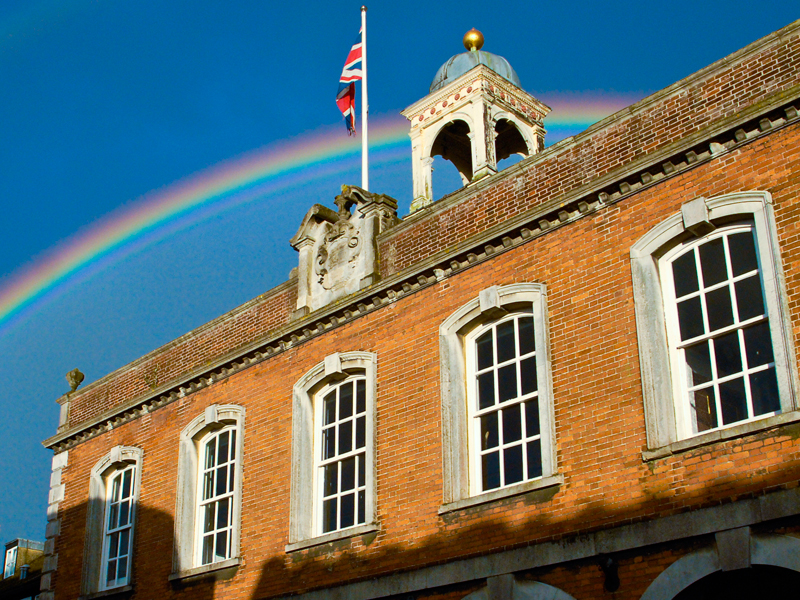Local government is an expensive mess. And poor old Rye, with its decaying Landgate, damaged cobbles and traffic chaos bumps along at the bottom of this mess. In the 1970s, somebody in central government had a particularly bad idea. This idea was to re-jig the system of local government and introduce an expensive third tier of bureaucracy to join parishes and counties. District councils were born and Rother was unleashed on the world. A seriously weakened Rye Town Council trailed in its wake.
Just when you might think things could not get any worse, they did. The following year, in a fit of fear, the new Rye Town Council gave away its remaining possessions, including the Salts and monuments to a kindly Rother, who charge the hapless residents for the loving care exercised over them. This charge is itemised in the Budget Books and is called Special Expenses. It increases your council tax and also leaves Rye Town Council with silver maces, regalia, badges for past mayors and less power than the smallest parish.
Most district and county councils are controlled by political parties. Political parties have few members. Less than one per cent of the electorate, according to a recent parliamentary briefing paper, belong to them. The membership of the RSPB (Royal Society for the Protection of Birds) outnumbers that of all political parties. Prospective councillors therefore are selected from only a very small pool of eligible candidates; the only qualification for membership being, apparently, the payment of whatever is the annual party sub.
There is no intelligence test and no required knowledge of (or even interest in) matters of housing, education, health, transport and environment over which the councillors will hold sway. Both district and county councils control giant twin bureaucracies. Their functions are muddled and few people are clear about exactly which council does what. For example, one council disposes of waste and the other one collects it. What they do have in common is the disposal of other people’s council tax.
I think it is a wasteful and expensive system, in desperate need of reform. What can people in Rye do? Nothing, sadly, to change the appalling system under which it operates. But here are a few practical suggestions:
- SPEND WISELY: Rye Town Council has in its power, the disposal of a not inconsiderable budget. We know that it is not the council’s money; it is other people’s money. A lot of people in Rye struggle to pay that council tax and it should be used as wisely as possible for the benefit of the community. Not squandered on expensive badges as gifts for past mayors!
- CONSULT MORE: They could publicise any bright new ideas with the residents of Rye before they appear on a council agenda. If somebody thinks it is a good idea in future to sell off the Town Hall Cottage, and turn it into a holiday let, or turn the council into a registered social landlord, they could tell people about it first and take on board their comments.
- SPEAK UP: They could speak up in council meetings so that members of the public can hear them. The acoustics are very poor in the Town Hall, the chairs creak horribly, and councillors who avert their eyes from the leprous public and mutter into their agendas do not help the cause of openness and transparency.
- CO-OPT WISELY: If a by-election is not called for the casual vacancy, the 15 councillors can co-opt, or select, any new candidate they like. Co-option of councillors is what happens in tiny country parishes. Anybody who wanders into one of their meetings, even if in possession of cloven hooves and a forked tail, runs the risk of being co-opted on to the parish council. Rye should be different and when David Ampthill resigned, no fewer than seven good members of the public volunteered for co-option as councillors. [Editorial note : “Lord Ampthill resigns over Maggie flag row” reported the Rye Observer in April 2013 and in June, having adopted a new co-option procedure, the council chose Michael Boyd]
- How could the Town Council make the bad system of co-option more equitable? One local government website advocates the publication of candidates’ details and statements of intent in the local press and online; declarations of any connections to the candidates, personal or pecuniary by councillors, and publication of votes cast and by whom.
- CHALLENGE MORE: Above all, Rye Town Councillors could make a concerted challenge to Rother and East Sussex about any bad treatment meted out to Rye!
Photo: Nick Taylor
Mary Smith is a former Rye Town Councillor
Image Credits: Rye News Library .




